Global Issues & ODA
Quality Education for All
Japan's Action
- International Trends Regarding the Sector
- Japan's Action
- Statistics
- References
- Links
- FAQs
Japan has been making international contributions through Official Development Assistance (ODA) for more than 60 years. Moreover, it has traditionally regarded education as an essential sector to support in order to promote human security. Education is a fundamental human rights that everyone should have equally, and enables individuals to enhance their potential and capacities and live with dignity. At the same time, it also plays a critical role in countries’ social and economic development. Education also creates a foundation for peace, by fostering understanding toward other people and other cultures. Education is the foundation for building understanding and trust in others and other cultures, and supporting peace. Up to the present day, Japan has been providing educational cooperation by leveraging the experience it has gained from modernization, postwar high economic growth, and overcoming various challenges.
Policies in the Education Sector
Cabinet Decision on the Development Cooperation Charter (February, 2015) (Excerpts)
II. Priority policies
(1) Priority issues
A. "Quality growth" and poverty eradication through such growth
The world's poor population is still large in number, and reducing poverty, especially eradicating absolute poverty, is the most fundamental development challenge. Especially as regards fragile states that have not been able to grasp the opportunities for development for different reasons and as regards people in vulnerable situations, it is important to provide both assistance from a humanitarian point of view and assistance designed to set the development process in motion and overcome vulnerability.
At the same time, in order to resolve the poverty issue in a sustainable manner, it is essential to achieve economic growth through human resources development, infrastructure development and establishment of regulations and institutions as well as the growth of the private sector enabled by the aforementioned actions, which are aimed at self-reliant development of developing countries. However, such growth should not be merely quantitative in nature, given that some of the countries that have achieved a measure of economic growth face challenges such as widening disparities, sustainability issues, inadequate social development, and political and economic instability. Rather, it should be "quality growth." Such growth is inclusive in that the fruits of growth are shared within society as a whole, leaving no one behind. It is sustainable over generations in terms of consideration to, among other aspects, harmony with the environment, sustained socio-economic growth, and addressing global warming. And it is resilient, able to withstand and recover from economic crises, natural disasters and other shocks. These are some of the challenges Japan has tackled in its postwar history. Japan will take advantage of its own experience, expertise and technology as well as lessons learned in order to provide assistance to realize "quality growth" and poverty eradication through such growth.
From this perspective, Japan will provide assistance necessary to secure the foundations and the driving force for economic growth. Its scope includes: the development of industrial infrastructure and industries through improvements in such areas as infrastructure, finance and trade and investment climate; sustainable cities; introduction of information and communications technology (ICT) and high technology; promotion of science, technology and innovation; research and development; economic policy; vocational training and industrial human resources development; employment creation; and the promotion of agriculture, forestry and fisheries that includes the development of food value chains. At the same time, Japan will provide assistance necessary to promote people-centered development that supports basic human life, taking full account of the importance of human and social development. It encompasses health care, safe water and sanitation, food and nutrition, quality education for all, disparity reduction, empowerment of women, culture and sports that brings about spiritual affluence.
Policies and Initiatives
(1) Learning Strategy for Peace and Growth
In conjunction with the UN Summit pertaining to the adoption of the "2030 Agenda for Sustainable Development" in September 2015, Japan announced a new strategy in the education sector. The new strategy was formulated as an issue-specific policy for the education sector in the Development Cooperation Charter, which had been decided on by the Cabinet in February 2015. In formulating it, opinions were exchanged widely with development and education experts, educational support NGOs, relevant international organizations, and more. The basic principles of the new strategy include: (1) Educational cooperation to achieve inclusive, equitable and quality learning, (2) Educational cooperation for industrial, science and technology human resource development and sustainable socio-economic development, and (3) Establishment and expansion of global and regional networks for educational cooperation. The aim is to realize quality education through mutual learning. Japan will further contribute to assistance in the education sector based on this new strategy.
(2) Japan's Education Cooperation Policy 2011-2015
At the UN Summit on the Millennium Development Goals (MDGs) in September 2010, Japan announced a new five-year cooperation policy in the education sector. Based on this policy, Japan will provide US$3.5 billion in five years starting from 2011, in order to contribute to achieving Education for All (EFA) and the education-related MDGs. Through this contribution, Japan will help to create a quality educational environment for at least 7 million children (a cumulative total of 25 million children). In addition to providing assistance in the basic education sector, Japan also reaches out to areas that are difficult for support to reach, such as alienated children and fragile countries. At the same time, it also provides assistance that takes into consideration continued educational opportunities for people who have completed primary education.
(3) Basic Education for Growth Initiative (BEGIN)
At the G8 Kananaskis Summit in June 2002, Japan announced "BEGIN: Basic Education for Growth Initiative." For this initiative, Japan put together specific approaches it would take in light of the international consensus to make providing basic education for all a universal goal, which was formed at the World Conference on the Promotion of Education for All (EFA) in 1990 and 2000.
(4) Japan's Efforts for Support in Education Sector
At the G8 Kananaskis Summit in June 2002, Japan made a commitment to provide ODA of more than 250 billion yen to the education sector (including support for international students, vocational training, etc.) over the next five years, in order to support low-income countries that were struggling to achieve the goals of the EFA Dakar Framework for Action. It has been providing assistance steadily ever since.
Examples from the Education Sector
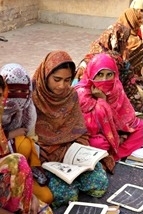 Assistance for literacy education in Pakistan
Assistance for literacy education in Pakistan(Photo provided by: JICA)
Egypt-Japan Education Partnership (EJEP)
In response to requests from the President of Egypt for assistance with human resource development, Japan is providing various kinds of assistance under the "Egypt-Japan Education Partnership" signed by the two countries in February 2016. The three most important initiatives in this partnership are: 1) focus on improving non-academic abilities such as discipline and cooperation, and introduce Tokubetsu Katsudo such as cleaning and class management meetings, which are characteristics of education in Japan; 2) provide comprehensive and focused support in all stages of education, from pre-school to higher education; and 3) dispatch at least 2,500 Egyptian students to Japan in the education and other sectors. These forms of assistance leverage the strengths of education in Japan, and are expected to contribute to the empowerment of Egyptian youth and stability and development in Egypt and the Middle East.
Assistance for Primary Education in Myanmar
As a result of the administrative transfer to civilian leadership in 2011, Myanmar has begun to work on comprehensive educational reforms, including elementary school curriculums, textbooks, pre-service and in-service teacher training, and academic achievement tests (assessments). These are wide-ranging reforms that encompass developing textbooks and teacher's guides for all subjects (10 in total: Burmese, English, math, science, social studies, moral education / civics, life skills, music, art and craft, and PE) for all elementary school grades (1 to 5), and developing teaching materials for training current teachers and for teaching-degree courses nationwide. Japan is providing integrated support, including providing know-how from Japanese publishers on textbook development and advice from Japanese university staff about what to teach in each subject. By 2021, 5.4 million school children and 250,000 teachers are expected to have benefited from it.
"School for All" Project
Around 80% of children in Sub-Saharan Africa lack basic literacy and numeracy. With assistance from Japan, the "School for All" project began in 2004 in order to respond to this kind of serious learning crisis. Since starting in Niger, the "School for All" model has also expanded to five neighboring francophone countries, Madagascar, and Ghana, and has been introduced into 45,000 elementary schools to date. What makes the "School for All" model unique is that it creates schools where all children have access to learning. This is achieved through collaboration and information sharing between communities, government agencies, and schools. This model is contributing to increased school enrollment rates in each country, and has been yielding significant improvements in children's literacy and numeracy in recent years. It can also potentially solve a variety of issues in the community besides education. For example, schools in Madagascar worked on health and nutrition issues by running their own school lunch services and teaching people about nutrition. In Burkina Faso, they taught residents about Ebola. These are just some of the ways the project is meeting communities' needs in multiple sectors.
ASEAN University Network / Southeast Asia Engineering Education Development Network (AUN/SEED-Net) Project
The aim of the AUN/SEED-Net Project is sustainable and stable economic development in ASEAN countries and the development of the engineering human resources needed to support it. Since Phase 1 was launched in 2003, it has been providing assistance to improve the educational and research capabilities of 26 top engineering universities in the 10 ASEAN countries. The project's achievements to date include helping over 1,400 university academic staff obtain a masters or doctoral degree, assisting more than 200 joint research projects with Japanese universities/industries, and contributing to the founding of an academic engineering journal (ASEAN Engineering Journal [AEJ]). It is currently in Phase 4.
Assistance for Non-Formal Primary Education Outside the School Education System, and for Adult Literacy Education
School enrollment and literacy rates in Pakistan are extremely low. These are difficult challenges to solve through approaches based on formal education alone, so Japan is providing assistance to develop a "non-formal education" system depending on the context on the ground. Specifically, the project is strengthening the foundations for promoting non-formal education, introducing data-driven management systems for it, and developing systems to ensure the education provided is of high quality. Through these activities, it is helping with the development of curriculums and textbooks for primary and adult literacy education that fit local needs, and providing out-of-school children of school age and illiterate adults with quality learning opportunities to acquire basic academic skills and literacy. It is also providing learning support for curriculums with additional subjects such as health, nutrition, and life skills, in order to promote social participation of girls and women, and address their daily-life needs.
Cooperation with International Organizations and Other Donors
(1) Examples of Cooperation with the United Nations International Children's Emergency Fund (UNICEF)
UNICEF is a United Nations agency that is working actively in around 190 countries and regions worldwide to protect the rights, lives, and healthy growth of children. Japan regards cooperating with UNICEF as important to promoting development policies. As such, it is strengthening its partnership with the agency in sectors such as education, health, nutrition, water and sanitation, and child protection, while discussing policies with it at a variety of levels.
Yemen
The Japanese government is providing assistance in cooperation with UNICEF in order to ensure continued access to education for children in the midst of prolonged conflict.
Conflict in Yemen continues, and many schools are unavailable because they have been destroyed or are being used as shelters. Working with UNICEF, the Japanese government has provided learning materials for more than 43,000 children and has improved school water and sanitation facilities, so that children can continue to receive a quality education in a safe environment even under such circumstances. In addition, Japan is helping to develop an environment where children can receive the psychological care they need and learn in safety. This is being achieved by providing teachers, social workers, and parents with training on psychosocial support for children.
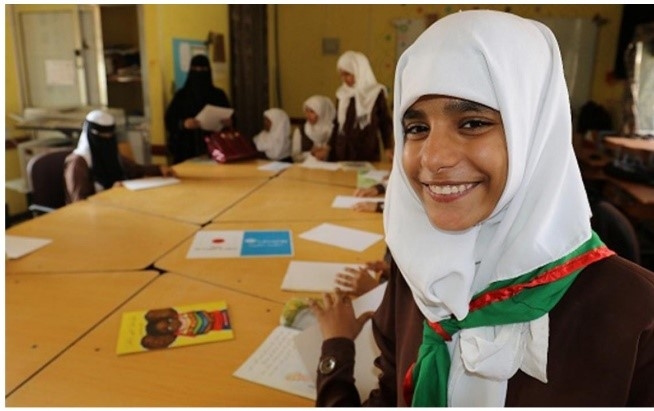 A girl at a school that has received assistance
A girl at a school that has received assistance
(c)UNICEF Yemen/2018/Abdulbaki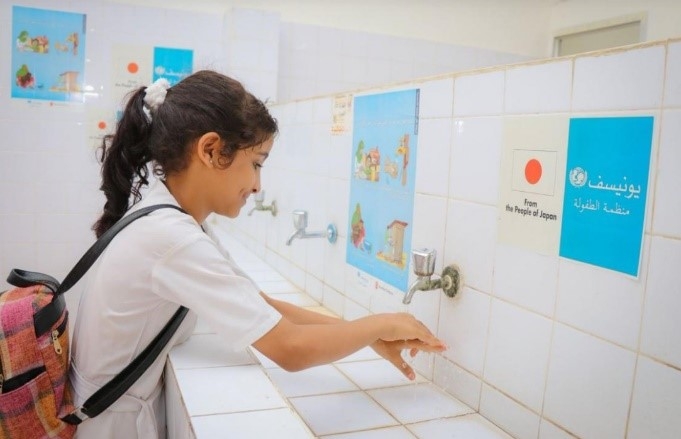 A girl washing her hands in a repaired school restroom
A girl washing her hands in a repaired school restroom
(c)UNICEF Yemen/2019/Ali Qasim Al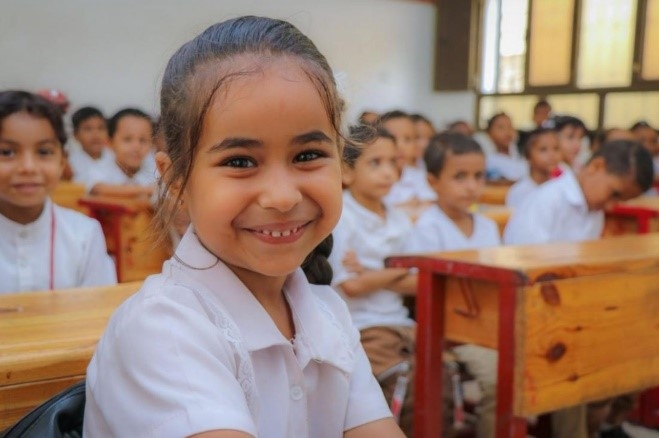 A girl at a school that has received assistance
A girl at a school that has received assistance
(c)UNICEF Yemen/2019/Ali Qasim Al
Laos
Pre-school education plays a crucial role in the intellectual and physical development of young children. In Laos, however, only one in three children aged five has access to pre-school education, and the quality of the lessons and services varies between regions.
The Japanese government is working with UNICEF to promote effective learning and enrollment in pre-school and primary education among children living in flood-stricken areas of Laos. For instance, in order to promote pre-school education, Japan has provided teachers with training on effective teaching methods, disaster risk reduction, and psychosocial support for children. It has also provided water and sanitation facilities such as restrooms and places for handwashing at schools in flood-stricken areas, and is supporting building up the capacity of the relevant government agencies at the national, regional, and local levels so that Laos will be able to provide and maintain climate-responsive water and sanitation services.
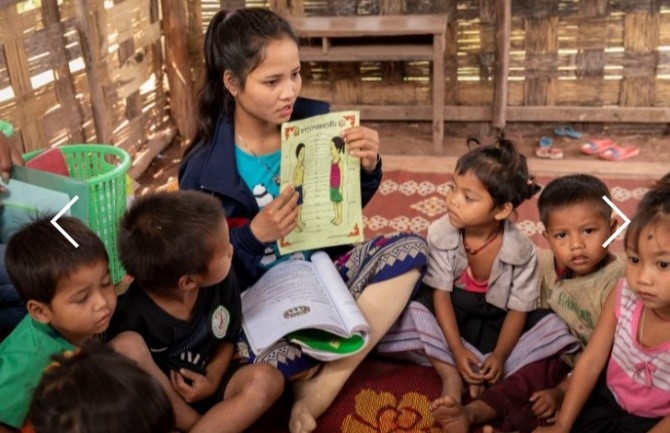 Children in Laos receiving pre-school education
Children in Laos receiving pre-school education
(c)UNICEF/UN0269002/Brown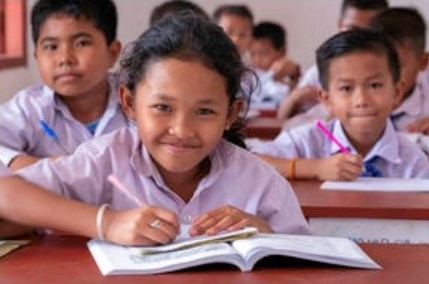 Children in Laos in class
Children in Laos in class
(c)UNICEF/UN0311115/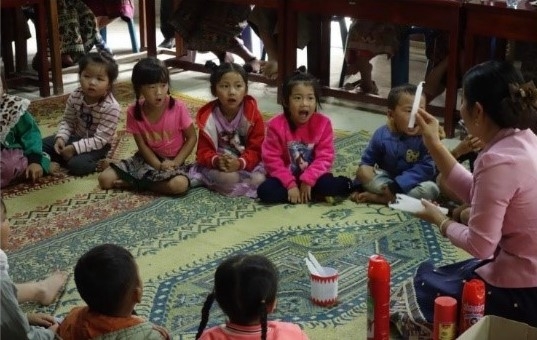 Children receiving pre-school education from a trained teacher
Children receiving pre-school education from a trained teacher
(c)UNICEF Laos/2019/Akina
(2) Global Partnership for Education (GPE)
The Global Partnership for Education is an international financing mechanism specially geared toward assistance for education. It is a multi-stakeholder partnership of governments, international organizations, members of civic society, private companies, etc. Japan also contributes to it as a donor. The GPE has 68 partner countries, most of which are low-income countries. It provides them with financial assistance for projects conducted based on education sector plans they formulate themselves. It also helps capacity building of stakeholders in education in the recipient countries.
Public Relations Events
Japan Education Forum for Sustainable Development Goals (JEF for SDGs)
As part of its international contributions in the education sector, Japan has been hosting the Japan Education Forum (JEF) jointly with the Ministry of Education, Culture, Sports, Science and Technology, the Ministry of Foreign Affairs, Hiroshima University, and the University of Tsukuba since March 2004. The objective of this forum is to exchange opinions on the importance of self-reliant educational development by the developing countries themselves, and the necessity of international cooperation on education to support it. It also aims to spread information widely around the world about Japan's experiences regarding and international cooperation on education.
Prompted by the adoption of the SDGs (Sustainable Development Goals) by the UN, the forum has been held under the name "JEF for SDGs" since 2016, with the focus on the SDGs. The purpose of this is to further enhance cooperation on education and the development of human resources, with a view toward achieving a sustainable future.


 /
/